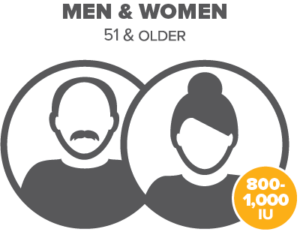38% of Americans don’t meet recommended intakes for calcium1

How much calcium do you need daily?2
Total amount of calcium from food and supplements, by age and gender.


Calcium absorption is as high as 60% in infants and young children,
who need substantial amounts to build bone. Absorption decreases to 15-20% in adulthood and continues to decrease as people age. This is why recommended intakes are higher for older individuals.

Your body’s ability to absorb calcium decreases as calcium intake increases.
Adults only absorb about 500-600 mg of calcium at once, so its best to take supplements in smaller doses with food.

More than 99% of the body’s calcium resides in the bones and teeth.2
Consuming adequate calcium is important in building strong bones in younger individuals and protecting bones as we age. If you don’t get enough calcium from the diet your body pulls it out of your bones to compensate.
Ways to get adequate calcium:

Add high calcium foods to your diet

Take a supplement
(only to fill dietary gaps)
Food choices to fill calcium shortfalls3
| CALCIUM CONTENT (mg) | RDA (%) | |
|---|---|---|
| YOGURT, 1 cup | 372 | 37 |
| TOFU, 1⁄2 cup | 253 | 25 |
| CHEDDAR CHEESE, 1 oz. | 204 | 20 |
| MILK, 1 cup | 129 | 13 |
| KALE, 1 cup cooked | 94 | 9 |
| KIDNEY BEANS, 1 cup canned | 92 | 9 |
| BROCCOLI, 1 cup cooked | 62 | 6 |

There is no strong evidence that links calcium supplementation to an increased risk of cardiovascular events.
Clinical trials find a null effect of calcium supplements on both cardiovascular outcomes and endpoints. Animal studies do not indicate a biological plausibility.4
1/273 women taking calcium supplements were diagnosed with a urinary stone.
Taking calcium supplements with food greatly reduces this risk and helps to prevent oxalate derived stones.5
According to the Institute of Medicine (IOM), the safe upper limit for calcium is 2,500 mg/day for adults between the ages of 19-50 years and 2,000 mg/day for individuals 51 years and older.

69.5% of Americans don’t meet recommended intakes for vitamin D.1
Vitamin D supplementation has been recommended to prevent falls in the elderly.6,7
Obese children and adults, as well as those who take anticonvulsant medications, glucocorticoids, antifungals such as ketoconazole, and medications for HIV/AIDS may need at least two to three times more vitamin D for their age group to satisfy their body’s vitamin D requirement.3
Food choices to fill vitamin D shortfalls3
| VITAMIN D CONTENT (IU) | RDA (%) |
|
|---|---|---|
| SALMON, sockeye 3 oz. | 375 | 63 |
| FORTIFIED MILK, 1 cup | 120 | 20 |
| BEEF LIVER, 3 oz. | 49 | 8 |
| EGG YOLK, 1 large | 37 | 6 |
| BUTTER, 1 Tbsp. | 9 | 2 |

Vitamin D can be obtained from the diet or produced by the skin when exposed to sunlight of sufficient intensity.
It is important in helping your body absorb calcium and pull it into your bones. Consider talking to your healthcare professional about supplementation if you are not getting adequate dietary intake and/or sun exposure.
A pooled analysis of over 70,000 elderly patients suggests that calcium with vitamin D supplementation decreased mortality by 7% over a 3 year period.5
How much vitamin D do you need daily?6
International Units (IU) by age and gender


NOTE: Some people need more vitamin D. According to the Institute of Medicine (IOM), the safe upper limit of vitamin D is 4,000 IU per day for most adults. These recommendations are for the general healthy adult population.
SOURCES:
- Fulgoni VL, Keast DR, Bailey RL et al. Foods, Forti cants, and Supplements: Where Do Americans Get Their Nutrients? J Nutr 2011; 141:1847-54.
- http://bonehealthandosteoporosis.org/calcium
- U.S. Department of Agriculture, Agricultural Research Service. 2012. USDA National Nutrient Database for Standard Reference, Release 25. Nutrient Data Laboratory Home Page, http://www.ars.usda.gov/ba/bhnrc/ndl.
- Weaver CM Calcium Supplementation: Is protecting against osteoporosis counter to protecting against cardiovascular disease? Curr Osteoporos Rep. (2014) 12:2011-218.
- Moyer VA on behalf of the U.S. Preventive Services Task Force. Vitamin D and calcium supplementation to prevent fractures in adults: U.S. Preventive Services Task Force Recommendation Statement. Ann Intern Med. 2013; 158:691-696.
- Final Recommendation Statement: Falls Prevention in Older Adults: Counseling and Preventive Medication. U.S. Preventive Services Task Force. December 2014.
- Holick MF, Binkley NC, Bischo -Ferrari HA, Gordon CM, Hanley DA, Heaney RP, Murad MH, Weaver CM. Evaluation, treatment, and prevention of vitamin D deficiency: an Endocrine Society Clinical Practice Guideline. J Clin Endocrinol Metab. 2011; 96:1911-1930.
- Renmark l, Avenell A, Masud T, Anderson F, Mayer HE, Sanders KM, et al. Vitamin D with calcium reduces mortality: patient level pooled analysis of 70,528 patients from eight major vitamin D trials. J Clin Endocrine Metab. 2012; 97:2670-2681.
BHOF thanks NatureMade for their support of this fact sheet.
